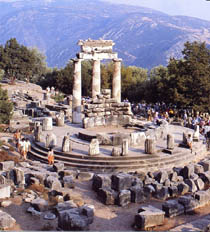
Greece concerned about the extent of looting of monuments
 |
"There is a terrible chaos, the situation is hard to control, in some regions there are increasingly illegal excavations," says Jorgos Gligoris, head of the brigade against the plundering of ancient monuments. He has only 19 people under his command for the whole country.
"The first thing a Greek thinks when he finds some antiquity in his field is how to sell it abroad," he complains.
Valuable old items thus mostly end up abroad, enriching private collections and sometimes European or American museums. The "trade" routes for art are really incredibly complicated.
For the first time, and following the Italian example, Greece recently filed a complaint against the J. Paul Getty Museum in Los Angeles and is demanding the return of four ancient monuments that were illegally exported from the country.
The prestigious museum has announced in another case that it will return four ancient works to Rome, which gave Athens hope that their request would end similarly.
Greek Minister of Culture Jorgos Vulgarakis announced that he wants to meet with the director of the Metropolitan Museum in New York, Philippe de Montebello, who recently returned several ancient artworks acquired in dubious ways to Rome.
The illegal trade in antiquities, which is a persistent issue, has added another puzzle to the team in recent years. In the five years that Gligoris has been leading his brigade, he has found that the number of cases of icon theft from monasteries and churches has significantly increased, as they are very easy to penetrate.
"Byzantine icons of immense value are then found with private individuals, from whom we confiscate them and hand them over to the Byzantine museum in Athens," he explains. He believes that these icons, which have a really high value, should not remain in monasteries.
"Thieves do not hesitate, they dismantle iconostases (temple walls with icons) and sell them on the market, which is a complete disaster," states Gligoris. He is outraged that the icon ceases to be an object of worship and becomes merely an artistic item collected by private individuals.
Gligoris is convinced that the entire trade, in which millions of euros are involved, primarily serves for money laundering. "An ancient object never loses its value; on the contrary, it grows year by year," he reminds.
The head of the brigade believes that repressive measures have been strengthened due to how the media has reported on cases of plundering ancient monuments. This has prompted countries to cooperate and sign bilateral and international agreements. "These agreements free our hands, and now we can start repatriating the items," he states.
Greece has embarked on close cooperation with Italy, and Minister Vulgarakis has requested a meeting with his Italian counterpart Rocco Buttiglione.
"Now, together with the Italians, we are investigating the fate of many items," says Gligoris, who has visited Rome several times in recent months accompanied by prosecutor Jannis Diotis, who has made a name for himself in Greece in the fight against terrorism.
"The Italians have really tackled the issue thoroughly. Prosecutor Paolo Ferri, with whom we cooperate, has been active in this matter for ten years and is now reaping the fruits of his work," asserts Gligoris. It is an example worth following for him.
The English translation is powered by AI tool. Switch to Czech to view the original text source.
0 comments
add comment






